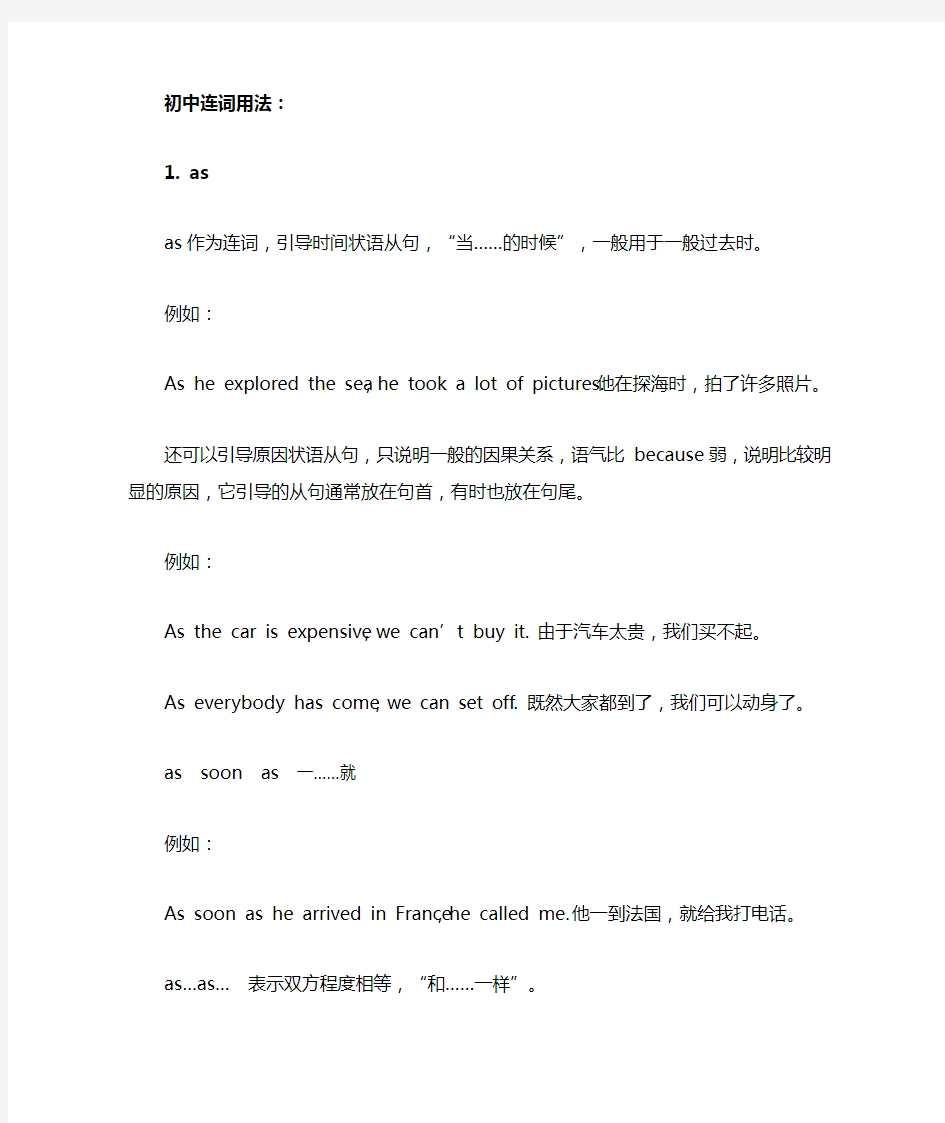
英语连词和介词用法讲解
- 格式:doc
- 大小:103.00 KB
- 文档页数:10


初中连词用法:
1. as
as作为连词,引导时间状语从句,“当……的时候”,一般用于一般过去时。
例如:
As he explored the sea,he took a lot of pictures. 他在探海时,拍了许多照片。
还可以引导原因状语从句,只说明一般的因果关系,语气比because弱,说明比较明显的原因,它引导的从句通常放在句首,有时也放在句尾。
例如:
As the car is expensive,we can’t buy it. 由于汽车太贵,我们买不起。
As everybody has come,we can set off. 既然大家都到了,我们可以动身了。
as soon as一……就
例如:
As soon as he arrived in France,he called me. 他一到法国,就给我打电话。
as…as…表示双方程度相等,“和……一样”。
基本句式:
A、主语+谓语(系动词)+as+原级形容词+as…
例如:
Xiao Li is as tall as his brother. 小李和他哥哥一样高。
Your jacket is as new as mine. 你的茄克衫和我的一样新。
B、主语+谓语(行为动词)+as+ 原级副词+as…
例如:
He speaks French as fluently as you. 他说法语和你说得一样流利。
Wang Ying teaches maths as conscientiously as her sister.王莹教数学和她姐姐一样认真。
2. a few;few;a little;little
few或a few在句中修饰可数名词,后接可数名词复数;也可用来代替复数名词。其中few表示否定,意为“几乎没有”,a few则表示肯定,意为“有一些”。
例如:
Few people lived here many years ago.许多年前几乎没有人住在这儿。
Look!You made a few mistakes in your homework.看!你在作业中出了几处错。
little或a little在句中修饰或代替不可数名词。其中little表示否定,意为“几乎没有”,a little表示肯定,意为“有一点”。
例如:
—How much wine did he have last night?昨天晚上他喝了多少酒?
—Just a little.只喝了一点点。
Hung up,we have little time left.快点,我们没有多少时间了。
a little还常用来修饰形容词、副词、动词,也可以修饰形容词或副词的比较级。
例如:
All of them felt a little tired.So they stopped to have a rest.
他们都感到有点累,所以他们停下来休息。
Lucy runs a little faster than I.露茜跑得比我快一点。
3. a little和a bit
a bit和a little通常可互换,也可修饰动词、形容词、副词。但在修饰名词时有区别:a little可直接修饰不可数名词;而a bit则要与of搭配才能修饰名词。
如:
Please open the windows.It's a bit hot.请把窗户打开,有点热。
This morning he only had a bit of milk for breakfast.今天早上他早餐只喝了一点牛奶。
注意:
not…a little意为“非常、很多、不少”,相当于very或quite等;而not…a bit则表示“一点也不”,相当于not at all等。
例如:
The boy isn't a bit hungry.那男孩一点也不饿。
The boy isn't a little hungry.那男孩非常饿。
4. besides,except,but
这三个词都可以用来表示转折,但是用法有所区别:
(1)except与besides 用于肯定句时,except意为“除…外(不再有)”;besides 意为“除…外(还有)”:
例如:
We all passed the exam besides Tom. 除了汤姆外,我们也都及格了(汤姆也及格了)
注意:
besides在句中的位置较活,可放在句首,亦可放在句中或句末;而except 多放在句尾。
(2)except前几乎总有all,any,every,no及其复合词等词,而besides前面可用也可不用,依句意而定:
例如:
He answered all the questions except the last one. 除最后一个问题没答外,其余问题他都答了。
All of them went to Beijing last summer besides Tom. 除了汤姆外,他们去年夏天也都去过北京。
(3)except,but,besides用于否定句时,可以互换。
如:
There aren’t any other people to be considered besides/except/but you.
除你之外,其他人将不予考虑。
I didn’t look anywhere besides/except in your bedroom. 除了你的卧室外,我哪儿也没去找。
(4)but和except都可以和for连用,构成短语;也可跟that 从句做宾语。
如:
l asked nothing from him but/except that he should write to me every other week.